What you can do now if a robot is coming for your job.
One of the summer jobs I had growing up was working in the exciting shipping department in my family's small-to-medium size business.
Scratch that. It was boring.
No, it was beyond boring.
Most of the time was spent unpacking clothes from boxes, hanging them on racks, and then later rearranging them, packing them into different boxes, piling the boxes on pallets and moving the pallets to the shipping dock to eventually be loaded onto trucks and sent off to clients.
The main differences from one order to the next were the clothes and box sizes. Otherwise, it was lather, rinse and repeat.
Chatting with co-workers slowed down the work noticeably in that assembly line atmosphere, so the only way to keep your sanity was by working within earshot of the radio as much as possible.
When I first started at 14, I was just happy to be working and earning a paycheck while helping my family. Pretty quickly though, I couldn't wait for it to end.
There were days where I would have paid for a robot to stand in for me, or so I told myself.
I have a feeling the job I'm doing right now could be a lot faster somehow. Or automated. Definitely automated.
— Mei Leng Yew (@widowedanthem) October 12, 2017
Back then in the early 00's, automated systems existed that could have done the entire process much faster but they were far too expensive to justify for our company.
Even when a friend helped me move on to a much larger shipping department with many more orders coming in and going out daily, it probably still didn't make much sense… it was just cheaper to have a team of minimum wage employees doing the work manually, as long as everyone was careful to avoid any expensive accidents (which happen all the time in such places, unfortunately for everyone involved).
That's probably not true anymore, however.
Note: There is a poll embedded within this post, please visit the site to participate in this post's poll.
With technology improving all the time, those automated systems have become much cheaper and more accessible even to the smallest of businesses. As a result, we've been hearing more and more scary warnings over the past few years about how many people are going to lose their jobs to robots, automation or technological advances plain and simple.
For example, an October 2017 PWC study estimates that almost 30% of all jobs in OECD countries will be replaced by automation by the early 2030s, with the United States to be particularly hard hit:
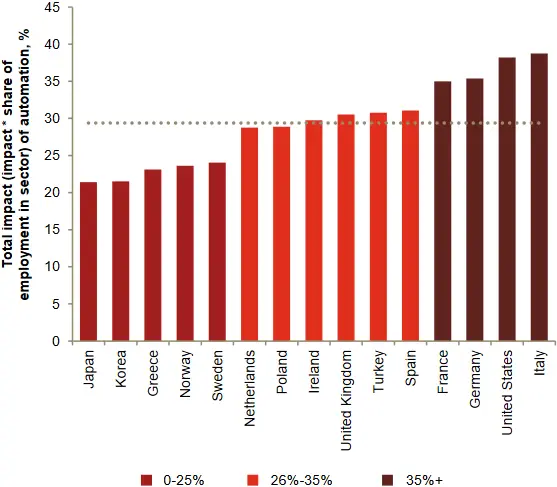
Which industries are most at risk?
The PWC study has a graphic for this too:
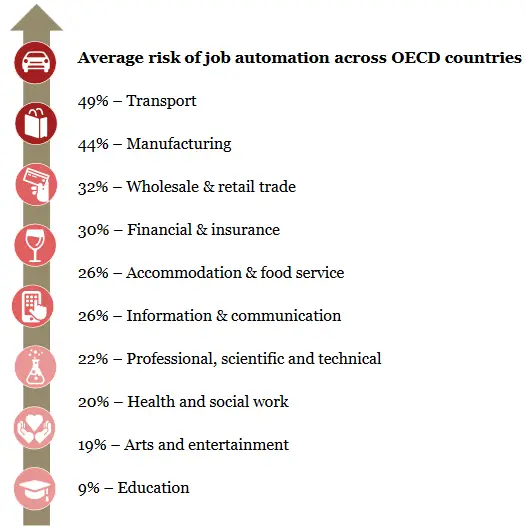
PWC's conclusion:
the sectors most at risk often involve manual or routine tasks, for example filling forms or solving simple problems. In contrast, sectors at low risk such as education and health care place a much greater focus on social and literacy skills which are relatively less automatable
Which professions are most at risk?
Visual Capitalist created this chart comparing the results of Frey and Osborne's 2013 study The Future of Employment: How Susceptible Are Jobs to Computerisation? with official 2016 US Bureau of Labor employment statistics.
Black bars show jobs that are more likely to be replaced, white bars are the opposite:
(Click here to see a much larger version of the chart)
Their conclusion:
It is mostly low-income jobs that risk being automated. Jobs that require social skills, creativity or higher education are less likely to.
Is this something you need to worry about?
A BBC page lets you enter a job title and it tells you when that job will be completely automated. If you type in “PM” it says “2016”.
— Alex (@alexpiletska) October 11, 2017
It depends.
At a glance, the numbers are scary but while the 30% mentioned in PWC's study is a lot, the flipside is that 70% of all jobs WON'T be replaced by automation by the 2030s, so there's a good chance you're safe.
If you're relieved that both Frey and Osborne's study and the PWC study agree that automation is mostly a blue collar concern, don't overlook that PWC estimates 22% of “Professional, scientific and technical” jobs to be impacted too, so white collar workers should pay attention moving forward too.
If you're over 45 and you don't feel the heat of automation in your industry yet, you'll probably old enough to retire before the automation wave arrives.
But if you're not old enough to retire by then, or regardless- if you really think your job is one of the ones more likely to become obsolete sooner than later, what can you do?
3 ways you can protect yourself from being automated out of a job
1) Move to a place where there's both more demand and less automation risk
Your entire industry won't automate overnight and lay off all the replaced employees in one shot. It's going to be a very gradual process that will take years.
If you suspect a layoff is coming, use job boards to gauge where there's still demand for people like you and consider moving where there's the most demand. It might even be in another country, such as one where the pace of automation is much slower for whatever reason.
When doing your company research, try to understand if a given employer is planning to automate sooner than later. It would be a shame to find a job only to be laid off again within a year or so.
2) Specialize
If you brand yourself as a top expert in your disappearing field, or in a disappearing niche in your field, you can dramatically improve your chances of staying in that field.
Technology replacing professions isn't a new thing. Most everyday professions dating from before the Industrial Revolution were replaced long ago, such as all kinds of smiths and makers.
However, even today you can still find people who practice these professions in specialty boutiques and artisan or craft workshops.
Often, these experts are carrying on a tradition, whether a family one or a local one, such as gondoliers in Venice.
Sometimes, they're just meeting demand that has fallen through the cracks. There's a shoemaker not far from here who you can't buy shoes from, but you can get a heel fixed there or a clean hole added to a belt.
Taking a look at more modern industries, as long as there are companies that rely on older technology, there will still be a need for people to maintain it. When the Y2K bug was discovered at the end of the 20th century, there was a surge in demand for programmers who could fix old computer systems that were affected.
A more automation-related example would be that the systems replacing human workers will still need some people who understand them and can check that they're actually correctly doing whatever it is they're supposed to do.
3) Use your transferable skills to change careers
You have skills.
Many of your skills are useful for other professions as well, which is what makes them “transferable”.
If you can identify unlikely-to-be-automated professions that most value your transferable skills, it'll be easier for you to change careers and escape the automation wave.
a) Start by listing your transferable skills
Many experts recommend some form of self-assessment, but career coach Ford Myers – listed in my 50 Career Coaches Who Give Free Consults On Every Topic You Need – hits the nail on the head in this short video with a different take:
The rule of thumb I recommend is to start by browsing your work portfolio for all the compliments, great evaluations, LinkedIn recommendations and other positive things people have said about you, and make a list of the skills mentioned.
Next, add to your list by following Ford's advice to ask relevant people about your greatest skills. If you find them hesitant, ask them for feedback on your initial list.
b) Find professions that most value your transferable skills
If you look back at Visual Capitalist's chart above, the jobs with long white bars are the ones most likely to not be replaced by machines. Look through the list for appealing jobs you think you could do, and then research the skills they require to see how well you qualify, perhaps even with some retraining.
Another angle would be to check the projected fastest-growing professions for the next decade or more, and then do the same skill-matching exercise.
c) Get out and information interview
Once your skill-matching research has lead to a few potential new career directions to consider more seriously, it's the perfect opportunity to reach out to people in those jobs for information interviews.
“I'm considering switching to your profession, and want to hear more about it from someone who's succeeded at it” is a great excuse to invite someone for coffee and ultimately get an opinion on whether you'd be a good fit in their role.
This article is part of Job Action Day 2017. This year's theme is “Using Transferable Skills to Give Your Career New Life“.
Question of the article
If you've changed careers in the past, how did you do it? Tell us in the comments.
Subscribe to JobMob via email and follow me on Twitter for more ideas on what to do when your job goes obsolete.
via JobMob More Information Here..

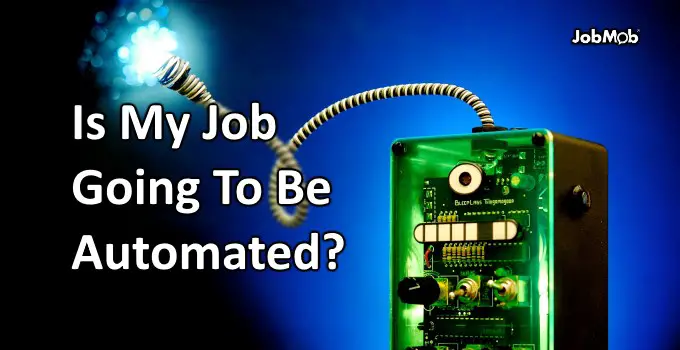
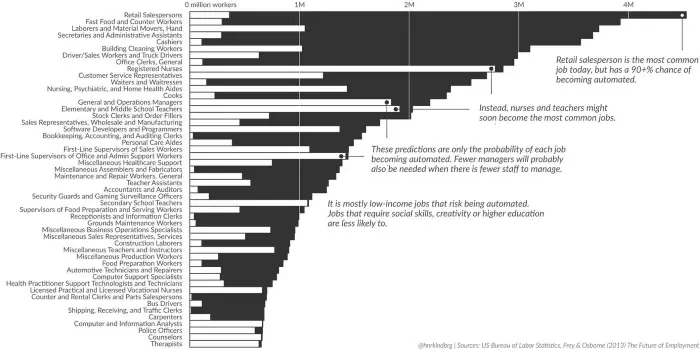
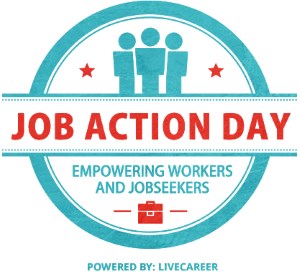
No comments:
Post a Comment